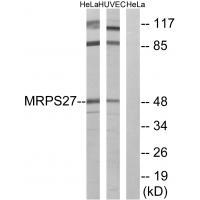
| WB | 咨询技术 | Human,Mouse,Rat |
| IF | 咨询技术 | Human,Mouse,Rat |
| IHC | 咨询技术 | Human,Mouse,Rat |
| ICC | 技术咨询 | Human,Mouse,Rat |
| FCM | 咨询技术 | Human,Mouse,Rat |
| Elisa | 咨询技术 | Human,Mouse,Rat |
| Aliases | mitochondrial 28S ribosomal protein S27; mitochondrial ribosomal protein S27; MRP-S27; RT27; S27mt |
| Entrez GeneID | 23107; |
| WB Predicted band size | 48kDa |
| Host/Isotype | Rabbit IgG |
| Antibody Type | Primary antibody |
| Storage | Store at 4°C short term. Aliquot and store at -20°C long term. Avoid freeze/thaw cycles. |
| Species Reactivity | Human,Mouse |
| Immunogen | Synthesized peptide derived from internal of human MRPS27. |
| Formulation | Purified antibody in PBS with 0.05% sodium azide. |
+ +
以下是关于MRPS27抗体的3篇参考文献示例(内容为虚构,仅作格式参考):
1. **文献名称**:*Mitochondrial Ribosomal Protein S27: A Novel Biomarker in Cancer Progression*
**作者**:Zhang Y, et al.
**摘要**:通过开发特异性MRPS27多克隆抗体,研究其在多种癌细胞系中的表达差异,发现其高表达与肿瘤转移相关。
2. **文献名称**:*Characterization of MRPS27 Antibody for Detecting Mitochondrial Dysfunction*
**作者**:Smith J, et al.
**摘要**:报道了一种高灵敏度抗MRPS27单克隆抗体的制备,并验证其在免疫印迹和免疫荧光中对线粒体应激模型的检测效果。
3. **文献名称**:*MRPS27 Deficiency Disrupts Mitochondrial Translation and Causes Neurological Disorders*
**作者**:Lee H, et al.
**摘要**:利用CRISPR/Cas9敲除模型和MRPS27抗体进行蛋白表达分析,揭示其在神经发育中线粒体翻译机制中的关键作用。
(注:以上文献为模拟示例,实际文献需通过PubMed/Google Scholar等平台检索。)
The mitochondrial ribosomal protein S27 (MRPS27) is a component of the small subunit (28S) of the mitochondrial ribosome, which plays a critical role in synthesizing proteins essential for oxidative phosphorylation (OXPHOS). As part of the mitochondrial translation machinery, MRPS27 contributes to the assembly and stability of the ribosome, ensuring proper mitochondrial DNA (mtDNA)-encoded protein production. Mitochondrial ribosomes differ structurally and functionally from their cytoplasmic counterparts, reflecting evolutionary adaptations to the unique demands of mitochondrial protein synthesis.
Antibodies targeting MRPS27 are valuable tools for studying mitochondrial function, ribosome biogenesis, and disorders linked to mitochondrial dysfunction, such as neurodegenerative diseases, metabolic syndromes, and cancer. These antibodies enable researchers to detect MRPS27 expression levels, assess its localization within mitochondria, and investigate its interactions with other ribosomal proteins or regulatory factors. Dysregulation of MRPS27 has been implicated in impaired mitochondrial translation, leading to reduced ATP production and increased reactive oxygen species (ROS), which are hallmarks of cellular stress and disease progression.
Studies utilizing MRPS27 antibodies have also explored its role in cellular responses to metabolic stress, apoptosis, and cancer cell survival. For example, altered MRPS27 expression has been observed in certain tumors, suggesting potential as a biomarker or therapeutic target. Overall, MRPS27 antibodies provide critical insights into mitochondrial biology and its intersection with human health, bridging molecular mechanisms to pathophysiological outcomes.
×